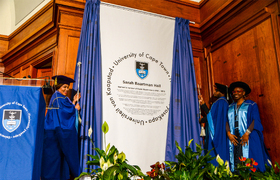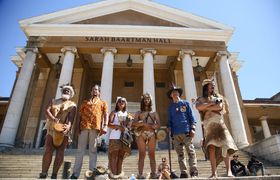Sarah Baartman: memory, space and legacy
18 September 2025 | Story Kamva Somdyala. Photos Lerato Maduna. Video Production Team Ruairi Abrahams, Boikhutso Ntsoko and Nomfundo Xolo. Read time 5 min.A blessing ritual by Khoisan activist !IKhōdanab ||Hui !Gaeb at the University of Cape Town’s (UCT) Sarah Baartman special colloquium marked the culmination of a vibrant process.
The colloquium was themed, “Honouring Sarah Baartman: Feminist Perspectives on Rights and Social Justice” and came a day after the hall on UCT’s upper campus was officially renamed. “Be blessed. It’s a great day, isn’t it? Today is important because we are here, in honour of the ancestors of the land. It is our duty to remember the ancestors of the land and their languages. My language is my pride. My language is my key. My language is my roots. My language is my foundation. My language is my power,” said !IKhōdanab ||Hui !Gaeb as proceedings got under way at the Hasso Plattner School of Design Thinking Afrika (d-school Afrika) on the evening of Thursday, 11 September.
The story of Sarah Baartman is well documented. In 2018, UCT made a deliberate choice to uphold Sarah Baartman Hall as a place of restoration, healing, growth and compassion.

Her Excellency ǂXuu Katrina Esau, the last remaining fluent speaker of the critically endangered N|uu – an ancient San language from the Tuu family – was also in attendance for both occasions. UCT bestowed an honorary doctorate on her in 2023. “That she is being honoured here and I’m able to see it, I’m glad about that. I think that she’d be very, very happy about it,” she said.
Writer and storyteller Diana Ferrus recited one of her poems, “I have come to take you home”. Vice-Chancellor Professor Mosa Moshabela – who was co-host of the evening with Chancellor Dr Precious Moloi-Motsepe – welcomed attendees: “Today her [Sarah Baartman’s] name is a reminder of the unfinished work of justice and a tribute to the Khoi and San people and all those historically silenced.”
Settler colonial power relations
The line-up of panellists included Dr Neziswa Titi (African Feminist Studies, UCT), Dr Camalita Naicker (Historical Studies, UCT), Professor Siona O’Connell (School of the Arts, University of Pretoria) and Charlene Houston (Centre for African Studies, UCT). Deputy Vice-Chancellor (DVC) for Transformation, Social Responsiveness and Student Affairs Professor Elelwani Ramugondo was the moderator.
“For some people the action of naming provides a directive for action,” commented Dr Naicker. “The renaming is a significant step for UCT. It forms part of a broader history of dealing with names and how they can be accepted and/or resisted. For many people, the evocation of a name like Sarah Baartman already signals the intimacy of settler colonial power relations.
“The name marks a certain experience as defined by the violence of colonial encounters for many. From a feminist perspective, I think that gender studies of colonialism have not reached their rightful place in many academic and political discourses.”
Dr Titi said: “When we ensure, and partake in being called names that undo us, we don’t get the chance to uphold people for who they are. We must ensure we reclaim our agency and power by calling ourselves who we are. With the renaming, we are saying that she is alive in us and that her story is alive in us. What she fought for and survived, we will do.”
Houston spoke about the need to investigate “repair processes to heal the shared wound”. “This is a moment on the continuum of the institutional transformation at the university. It is moving away from pain and trauma and the horrors of colonial practices and moving towards the decolonial.”
Symbolism
“There is no point,” cautioned Houston, “in moving away from decolonisation if we do not re-indigenise. How does that look and what does the work mean for us. That work is about co-labouring and acknowledging epistemologies that have been excluded in our curriculum as we go forward and about respecting and bringing dignity back to knowledge, voices and people who have been sent underground for too long.”
Professor O’Connell urged the audience to not forget the symbolism of UCT and its location and how that shapes perception. “The view from the hall provides a daily reminder of South Africa’s profound inequalities and overlooks impoverished communities.”
Audience members also had an opportunity to engage panellists, speaking on issues such as erasure and how student leaders should take pride in the occasion given the Rhodes Must Fall and Fees Must Fall protests of 2015, which were part of a broader transformation drive.
 This work is licensed under a Creative Commons Attribution-NoDerivatives 4.0 International License.
This work is licensed under a Creative Commons Attribution-NoDerivatives 4.0 International License.
Please view the republishing articles page for more information.





















